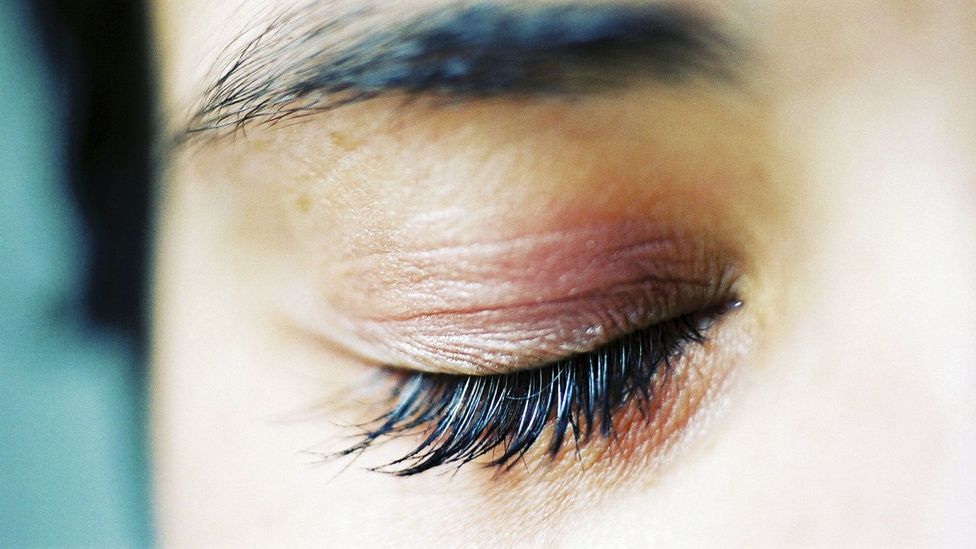The eyes are closed during sleep and the eyelids rest on the eyeballs. The muscles in the eyeballs relax, allowing them to roll back into their sockets. This position helps protect the eyes from being damaged or scratched while we sleep.
When you sleep, your eyes go through a lot of changes. For one, they produce less tears, which can lead to dryness and irritation. Additionally, the muscles in your eyelids relax, causing them to droop.
This can lead to temporarily blurred vision. Finally, your pupils dilate, or widen, in order to let in more light.
Why Do Your Eyes Roll Back When You Sleep
The eyes roll back when you sleep for a few reasons. One reason is that the eyelids become heavier and gravity pulls them down. Another reason is that the muscles in the eyeballs relax and they fall back into their sockets.
Lastly, as you drift off to sleep, your body becomes more relaxed and your head may fall back or to the side, causing the eyes to roll back.
Where Do Your Eyes Go When You Close Them
When you close your eyes, your visual system is still active. Your brain continues to receive information from your eyes and process it, even though you are not consciously aware of what you are seeing. This is because the part of your brain that controls vision, the occipital lobe, is always working, even when you are asleep.
There have been several studies investigating what happens when we close our eyes. One study used eye tracking to show that when we close our eyes, our gaze remains relatively stable. Our eyes may wander a bit, but they tend to fixate on a point in space just above and between our eyebrows.
This point is known as the “third eyelid” or “eyelid triptych.”
Another study used fMRI to show that when we close our eyes, different areas of the occipital lobe become activated. These include the lateral geniculate nucleus (LGN), which receives input from the retina; the primary visual cortex (V1), which processes basic features of images; and the higher-level visual areas such as V2 and V3.
Interestingly, these higher-level areas are also active when we view complex scenes with our eyes open. This suggests that even though we are not consciously aware of it, our brain is still processing visual information when we close our eyes.
So what does all this mean?
It means that closing your eyes does not completely darken your world – your brain continues to receive visual information and process it in ways that we do not yet understand.
Eye Movement While Sleeping
Your eyes move rapidly in different directions while you sleep. This is called rapid eye movement (REM) sleep. Your eyes may move side to side, up and down, or in a circle.
REM sleep is when you dream.
During a normal night’s sleep, you will cycle through different stages of sleep. The first stage is when you are falling asleep.
Your eyes will slowly close and your muscles will relax. You may experience brief periods of muscle twitching. The second stage is light sleep.
Your eye movement slows and your muscles continue to relax. You may experience brief periods of wakefulness during this stage. The third stage is deep sleep.
Your eye movement stops and your muscles are fully relaxed. You may not be aware of your surroundings during this stage.
REM sleep makes up 20-25% of most people’s sleeping time.
Do Your Eyes Roll Back When You Sleep Reddit
Do your eyes roll back when you sleep? It’s a common question, and one that doesn’t have a definitive answer. Some people say yes, while others claim they’ve never experienced it.
And then there are those who say it depends on the person.
There isn’t a lot of scientific evidence to support any of these claims. However, some experts believe that eye rolling during sleep is normal and simply indicates that the person is in a deep state of relaxation.
Others believe that it could be a sign of an underlying medical condition, such as narcolepsy or sleep apnea.
If you’re concerned about your eye rolling habit, talk to your doctor. They can help determine if there’s an underlying cause and provide appropriate treatment options.
What Happens to Your Eyes When You Close Them
When you close your eyes, a number of things happen. For one, your eyelids provide a physical barrier that blocks out light. This is important because light is a key factor in keeping you awake.
When it’s dark, your body produces melatonin, which makes you sleepy.
Closing your eyes also gives your brain a break from processing visual information. This can be helpful if you’re trying to relax or fall asleep.
It can also help reduce stress and fatigue.
Your eyes are still active when they’re closed, though. They move back and forth in a process called saccades.
This helps keep the surface of your eyeballs lubricated and prevents them from drying out.
Can Lack of Sleep Cause Eye Strain
It’s no secret that a good night’s sleep is important for our overall health and well-being. But did you know that lack of sleep can also cause eye strain?
Eye strain is a condition that occurs when your eyes are tired from overuse or extended periods of use.
Symptoms of eye strain include headaches, fatigue, blurred vision, and difficulty focusing.
While anyone can experience eye strain, it’s more common in people who spend a lot of time staring at screens, such as computers, phones, and tablets. This is because the blue light emitted by these devices can be harmful to our eyes and cause them to become dry and irritated.
If you’re suffering from eye strain, the best thing you can do is give your eyes a break. Take regular breaks from looking at screens and make sure to get plenty of rest each night. If your symptoms persist, consult with an eye doctor for further treatment options.
Do Your Eyes Roll Back When You Blink
When you blink, your eyes roll back briefly in their sockets. This seemingly odd behavior actually serves an important purpose. Rolling your eyes back when you blink allows your eyelids to spread tears evenly over the surface of your eyeballs.
Without this rolling motion, your tears would not be distributed properly and your vision could be impaired.
So why do our eyes roll back when we blink? It all has to do with the shape of our eyeballs.
The front part of the eye is curved, while the back part is more spherical in shape. This difference in shape causes light to enter the eye differently at different angles. When your eyelids close during a blink, they cover both the curved front part of your eye and the more spherical back part.
If your eyes didn’t roll back when you blinked, the tear film that coats your eyeballs would not be spread evenly over their surfaces. The result would be dry spots on your eyeballs that could lead to blurred vision or other problems. So next time you notice your eyes rolling back when you blink, know that it’s just nature’s way of keeping things running smoothly!
What Happens to Your Eyes When You Don’T Get Enough Sleep
It’s no secret that a good night’s sleep is important for overall health, but did you know that it’s also critical for eye health? When you don’t get enough sleep, your eyes can suffer in a number of ways.
For starters, sleep deprivation can lead to dry eyes.
This happens because when you’re tired, your body doesn’t produce as much tears as it normally does. As a result, your eyes can feel irritated and uncomfortable.
Sleep loss can also cause blurry vision.
This is because when you’re tired, your eyes have a hard time focusing on objects. If you find yourself squinting to see things more clearly, it’s a sign that you need to get some rest!
Finally, not getting enough sleep can lead to serious long-term problems like glaucoma and cataracts.
So if you value your vision, make sure to get plenty of shut-eye!

Credit: www.bbc.com
What Do Your Eyes Do When Sleeping?
When you sleep, your eyes remain active. Your eyelids close, but your eyeballs move rapidly in a side-to-side motion. This is called rapid eye movement (REM) sleep.
REM sleep is when you dream.
During non-REM sleep, your eyes may move slowly from side to side or up and down. Your eyelids will be closed, but they may flutter occasionally.
Why Do Our Eyes Roll Back When We Sleep?
When we sleep, our eyes roll back because the muscles that control our eyelids are relaxed. This is a natural process that happens to everyone. Our brains are also more active when we sleep, which can cause our eyes to move around as well.
What Happens When You Close Your Eyes to Sleep?
When you close your eyes to sleep, your brain begins to produce alpha and theta waves. Alpha waves are associated with relaxation and theta waves are associated with drowsiness and sleep. As you produce more of these waves, your body begins to relax and you may feel yourself falling asleep.
Do Your Eyes Move While You Sleep?
It’s a common myth that our eyes move during sleep, when in fact they are mostly still. Eye movements do occur during certain stages of sleep, but these are very different from the rapid eye movements (REM) that happen when we are awake. Our eyes may twitch or flutter briefly during REM sleep, but this is not the same as the purposeful movement of our eyes when we are conscious.
Sleep Expert Debunks Common Sleep Myths | WIRED
Conclusion
It’s no secret that getting a good night’s sleep is important for your overall health, but did you know that it’s also crucial for the health of your eyes? When you sleep, your body and brain are able to rest and repair themselves, and this includes your eyes. Here’s a look at what happens to your eyes when you sleep and how it can benefit your vision.
During sleep, your eyes are able to recover from the day’s activities. This is because the muscles in your eyes relax and the blood vessels dilate, which allows more oxygen-rich blood to flow to the eye tissues. This increased blood flow helps to nourish and heal the cells in the eye, which can be beneficial if you’ve been experiencing eye strain or fatigue.
Additionally, sleeping gives your tear glands a chance to produce more tears, which can help keep your eyes lubricated and prevent dryness.
Getting enough shut-eye is also important for maintaining healthy vision in the long term. Studies have shown that people who don’t get enough sleep are at greater risk for developing serious eye problems like glaucoma or age-related macular degeneration.
So if you want to keep your eyes healthy and improve your vision, make sure you’re getting plenty of rest!

